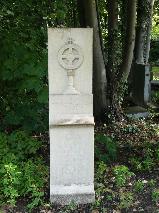Cohen, Hermann |
| PIANIST, COMPOSER (GERMANY) |
|
BORN 10 Nov 1820, Hamburg - DIED 20 Jan 1871, Berlin CAUSE OF DEATH smallpox GRAVE LOCATION Berlin: Alter Domfriedhof der St.-Hedwigs-Gemeinde, Liesenstrasse 8 (cenotaph) |
|
Hermann Cohen came from a prosperous Jewish family of bankers. He started to play the piano when he was four years old. When he was seven his teacher araanged concerts for him in Altona and Franufrt. But he also taught him gambling. When he was twelve his mother took him to Paris to continue his studies but as a foreigner he was denied admission to the conservatory. After initial hesitation Franz Liszt accepted him a pupil. Cohen soon became a favourite. He called him Puzzi and introduced him to George Sand, who liked him and called him "Le Mélancolique Puzzi". List suddenly left Paris with his lover Marie d'Agoult. Cohen asked permission to join him in Geneva and Liszt relented. He often travelled with Liszt and Marie d'Agoult. In 1837 Liszt returned to Paris and he followed him once more. His gambling debts pressed upon him and a concert was arranged for him, but it went badly. He turned to his father for support but he couldn't help him. Grand Duke George of Mecklenburg-Strelitz sponsored several concerts to help him. He was able to return to Patis where he teamed up with th singer Mario. Together they performed in London. In 1839 he was in debt again and Marie d'Agoult tried to use an affair with a married woman to keep Liszt away from him. he broke with Liszt in 1841 after he was accused of stealing money from concerts. He travelled through Europe for five years until he settled in Paris in 1846. In 1847 he fell in love with circus rider Celeste Mogadar. They shared a passion for music, but their relationship ended abruptly after he indicated that he wanted to turn to God. After a final concert to settle his debts he joined the Order of the Carmelites in 1849. In 1851 he became a preacher and he preached in many cities in Europe. His relations with Liszt improved in 1852 and they finally met again in 1862 in Rome. After working he in England he retired to Tarasteix. During the Franco-Prussian War he attended French prisoners as a prison chaplain in Spandau. Many of the were ill. He was infected with smallpox and died in Berlin in 1871. He was buried in St. Hedwig's Cathedral. After the cathedral was destroyed during the Second World War his remains were buried in the St. Hedwig Cemetery. In 2008 they were exhumed and transferred to Le Broussey where he had once joined the Order of the Carmelites. Related persons • knew d'Agoult, Marie • was pupil of Liszt, Franz |
| Images |
Sources • Hammer, Klaus, Historische Friedhöfe & Grabmäler in Berlin, Stattbuch Verlag, Berlin, 1994 • Hermann Cohen (Carmelite) - Wikipedia |



